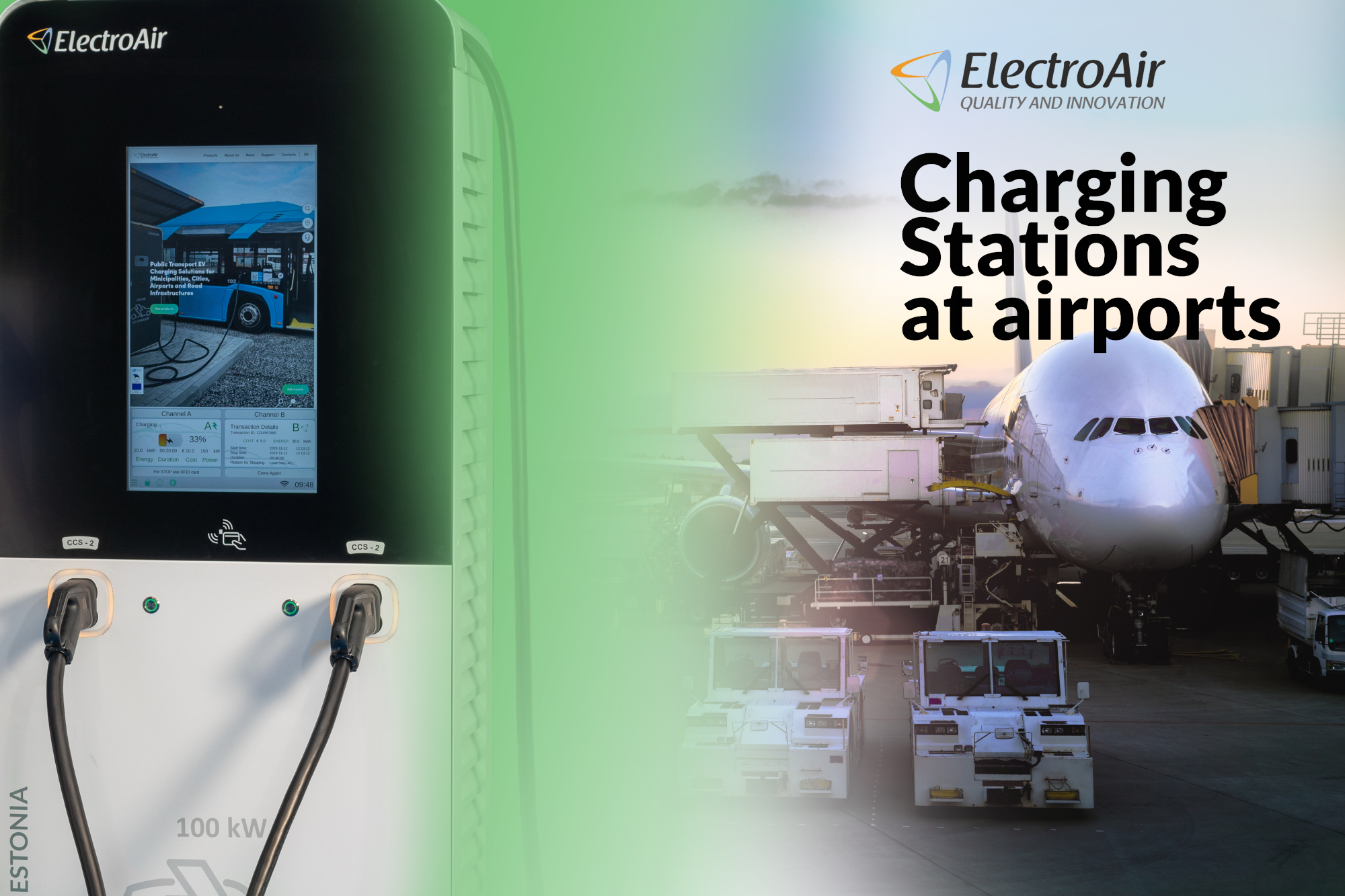Electrifying Airports: The Rise of Charging Stations for Electric Vehicles
| Company | ElectroAir |
|---|---|
| Date | 04.03.2024 |

As the world moves towards a more sustainable future, the transportation sector plays a crucial role in reducing greenhouse gas emissions. Electric vehicles (EVs) have gained immense popularity in recent years, and airports are no exception to this trend. With the rise of electric tractors (electrotractors) and electric buses (electrobuses) at airports, the need for efficient charging infrastructure has become paramount. In this article, we explore the growing importance of charging stations for electric vehicles in airports and their significant impact on sustainability efforts.
Airports are bustling hubs of activity, with numerous ground support vehicles and buses working tirelessly to transport passengers, luggage, and cargo. Traditionally, these vehicles have relied on fossil fuels, contributing to air and noise pollution. However, with the advancement of electric vehicle technology, airports are transitioning towards cleaner and greener alternatives.
Electrotractors: The Eco-Friendly Workhorses
Electrotractors, also known as electric tugs or electric baggage tractors, have gained traction in the aviation industry. These electric-powered workhorses are designed to move aircraft and handle baggage efficiently. By utilizing electricity as their energy source, electrotractors eliminate harmful emissions and reduce noise levels compared to their diesel counterparts. They offer enhanced maneuverability, lower maintenance costs, and a greener operational profile.
Electrobuses: Silent and Sustainable
Electrobuses, or electric buses, are increasingly being deployed at airports to transport passengers between terminals, parking lots, and other airport facilities. These zero-emission vehicles contribute to improving air quality and reducing noise pollution in and around the airport premises. Electrobuses offer a quieter, more comfortable ride for passengers and play a vital role in creating a sustainable transportation network within airports.
Charging Stations: Empowering Electric Vehicles
The success of electric tractors and buses at airports hinges on the availability of reliable and efficient charging infrastructure. Charging stations are essential to keep these vehicles running smoothly and ensure they are ready for service at all times. Here are some key aspects of charging stations for electric vehicles in airports:
- Fast Charging: Airports require charging solutions that minimize downtime for vehicles. Fast-charging stations, equipped with high-capacity chargers, can rapidly recharge the batteries of electrotractors and electrobuses, allowing them to return to service quickly.
- Convenient Placement: Charging stations should be strategically located throughout the airport to ensure easy access for electric vehicle operators. Placements near terminals, parking lots, and other high-traffic areas help maintain efficient operations and reduce unnecessary downtime.
- Scalability: As the adoption of electric vehicles grows, airports must consider the scalability of their charging infrastructure. Planning for future capacity expansions will accommodate increasing fleets of electrotractors and electrobuses, preventing charging bottlenecks and ensuring a seamless transition to electric transportation.
- Smart Charging Management: Implementing intelligent charging management systems enables optimal utilization of charging infrastructure. These systems can optimize charging schedules, balance energy demands, and even integrate renewable energy sources, further enhancing the sustainability of airport operations.
Benefits and Impact on Sustainability
The implementation of charging stations for electric vehicles at airports offers numerous benefits, including:
- Reduced Emissions: By replacing traditional diesel-powered vehicles with electric alternatives, airports significantly reduce greenhouse gas emissions, improving air quality and mitigating climate change.
- Noise Reduction: Electric vehicles produce significantly less noise compared to their fossil fuel counterparts, contributing to a quieter and more pleasant airport environment for passengers and staff.
- Operational Cost Savings: Electric vehicles often have lower maintenance and operational costs, leading to potential cost savings for airport operators in the long run.
- Positive Public Image: Embracing electric vehicle technology and sustainable practices can enhance an airport’s reputation as an environmentally responsible organization, attracting environmentally conscious travelers and stakeholders.
The Growth of Charging Stations at Airports
In recent years, there has been a notable increase in the number of charging stations for electric vehicles at airports worldwide. According to data from the International Air Transport Association (IATA), the number of electric vehicle charging stations at airports has more than doubled in the last two years. In 2022, there were approximately 1,500 charging stations at airports globally, and by 2024, this number is expected to exceed 3,000. This rapid growth reflects the aviation industry’s commitment to sustainability and the increasing demand for electric ground support vehicles and buses.
ElectroAir: Leading the Charge in Charging Infrastructure
One company at the forefront of providing charging solutions for electric vehicles at airports is ElectroAir. Founded in 2006, ElectroAir is a leading manufacturer of ground power units and electric vehicle charging stations, specializing in solutions for airports, seaports, and other transportation hubs. The company’s charging stations are designed to meet the unique needs of airport operations, offering fast charging capabilities, convenient placement, and scalability.
ElectroAir’s charging stations are equipped with advanced features such as smart charging management systems, which optimize energy usage and reduce operational costs. The company also offers customizable solutions to accommodate various types of electric vehicles, including electrotractors, electrobuses, and electric ground support equipment. ElectroAir’s commitment to innovation and sustainability has made it a trusted partner for airports seeking to electrify their ground transportation fleets.
The electrification of ground support vehicles and buses at airports is a significant step towards reducing the aviation industry’s environmental footprint. Charging stations play a crucial role in supporting the transition to electric vehicles, ensuring they are powered efficiently and ready for service. With the increasing availability of charging infrastructure and the commitment of companies like ElectroAir, airports are well-positioned to embrace electric transportation and contribute to a greener future.
Our ElectroAir team is thrilled to invite you to our booth at Hannover Messe 2024. One of the world’s biggest industrial exhibitions will take place between 22-26th April, and our booth number E44, Hall 6 – stand of ESTONIA. We will really appreciate your decision to visit us and get familiar with our innovative products! We look forward to becoming well connected! https://www.hannovermesse.de/exhibitor/electroair/N1514020
Contact us: charger@electroair.eu


